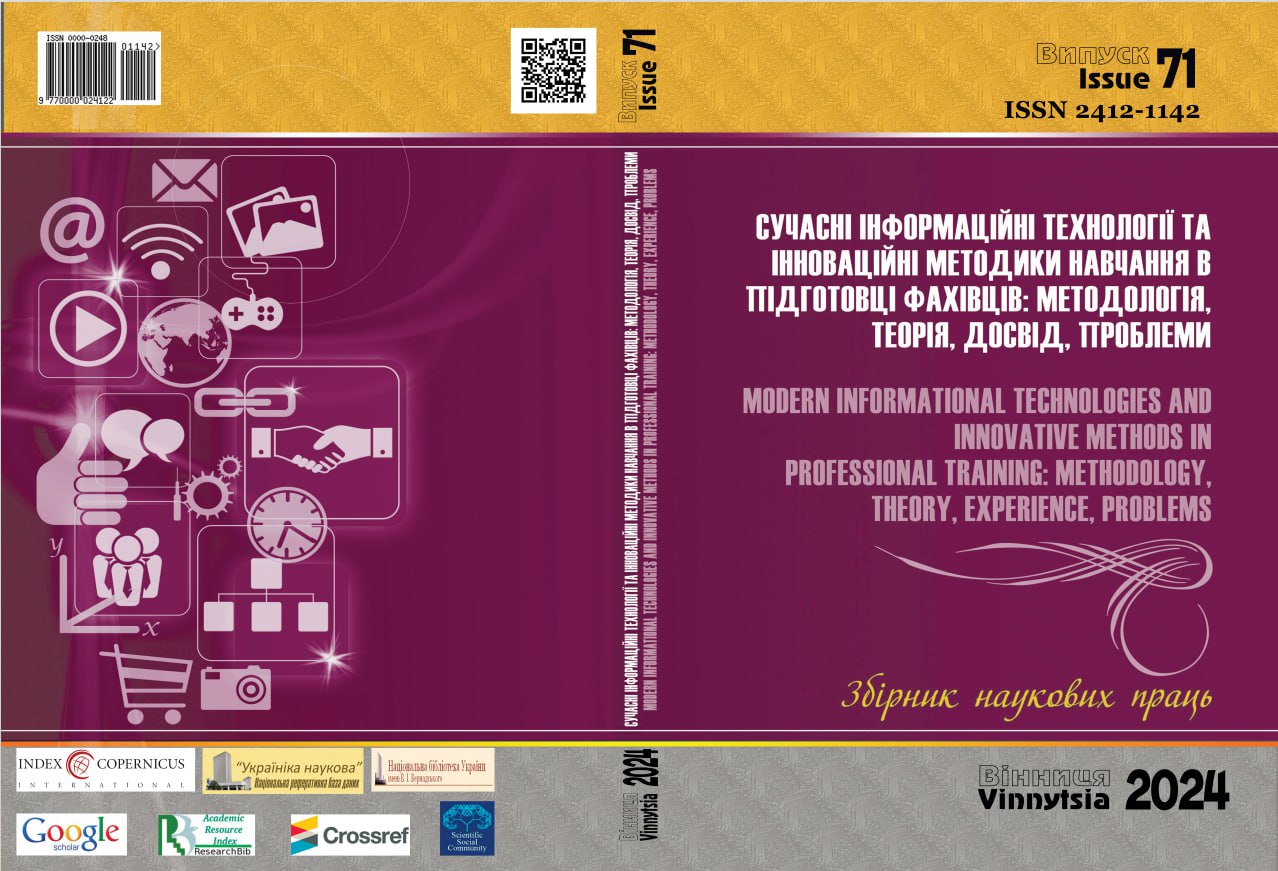IMPLEMENTATION OF STEM EDUCATION IN THE PROCESS OF PROFESSIONALTRAINING OF FUTURE TEACHERS
DOI:
https://doi.org/10.31652/2412-1142-2024-71-30-39Keywords:
STEM-education; STEM-competencies; professional training; future teachers; pedagogical educationAbstract
The article is devoted to the topical issue of introducing STEM-education into the process of professional training of future teachers. The introduction substantiates the relevance of the research related to the needs of information society for specialists who possess STEM-competencies. The problem statement lies in defining effective strategies, methods, and practices for integrating STEM-approaches into pedagogical education, as well as evaluating their impact on training future teachers for modern educational environments. The analysis of recent research provides insights into the theoretical foundations of STEM-education and the experiences of implementing STEM-approaches in education both in Ukraine and abroad. The theoretical framework of the study is grounded in the works of domestic and international scholars in STEM-education, pedagogy, and psychology. The research results reveal effective strategies, methods, and practices for implementing STEM-approaches in pedagogical education and assess their influence on the formation of STEM-competencies in future teachers. The conclusions summarize the research findings and outline prospects for further research in this field. The article underscores the importance of implementing STEM-education (Science, Technology, Engineering, Mathematics) in the training process of future teachers. The authors justify the necessity of integrating STEM-competencies into pedagogical practice in light of contemporary educational demands and the job market. They analyze approaches to integrating STEM-education into teacher training programs and highlight methods and tools that facilitate effective preparation of educational professionals with a STEM-component in mind. Furthermore, the article examines the challenges and prospects of implementing STEM-education in higher pedagogical education and provides recommendations for further research and development in this field. The conclusions of the article contribute to understanding and developing strategies for implementing STEM-education in the training of future educators with the aim of enhancing their competitiveness in the modern job market.
Downloads
References
Гриневич Л., Морзе Н., Вембер В. та Бойко М. (2021). Роль цифрових технологій у розвитку освітньої екосистеми STEM. Журнал "Інформаційні технології та засоби навчання", вип. 83(3). doi: https://doi.org/10.33407/itlt.v83i3.4461.
Liudmyla Shevchenko, Yaroslava Pylypenko et al. Organisation of the Educational Process Through the Technology of Blended Learning. The New Educational Review, 2022. Vol. 68, No. 2. DOI: https://doi.org/10.15804/tner.2022.67.1.16.
Shevchenko L., Kryzhanovskyi A. Experimental verification of the efficiency of formation of trainee teachers’ professional competence with the use of Web technologies // Information Technologies and Learning Tools. Vol 66. No 4 (2018). pp. 197-206. URL: https://journal.iitta.gov.ua/index.php/itlt/article/view/2112 .
Anderson Norris. (2020). Rethinking STEM Education: Pathways to an Inclusive and Equitable System.
Resnick, Mitchel. (2017). Lifelong Kindergarten: Cultivating Creativity through Projects, Passions, Peers, and Play. Cambridge, Massachusetts: MIT Press.
EU4Digital Initiative. (2020). Електронний ресурс.. Доступно: https://eufordigital.eu/discover-eu/theeu4digital-initiative Дата доступу: 10.0920.
Іглесіас-Прадас С., Ернандес-Гарсія А., Чапарро-Пелаес Х. та Прієто Дж. Л. «Надзвичайне дистанційне навчання та академічна успішність студентів у вищій освіті під час пандемії COVID-19: практичне дослідження». комп. в Хумі. Бех., вип. 119, 106713, 2021. doi: https://doi.org/10.1016/j.chb.2021.106713.
Міністерство освіти і науки України. (2017). Методичні рекомендації щодо впровадження SТЕМ-освіти у загальноосвітніх та позашкільних навчальних закладах України на 2017/2018 навчальний рік Електронний ресурс.. Лист ІМЗО № 21.1/10-1470 від 13.07.17 року. Режим доступу: https://osvita.ua/legislation/Ser_osv/56880.
Міністерство освіти і науки України. (2019). Концепція Нова українська школа. Електронний ресурс.. Режим доступу: https://mon.gov.ua/ua/tag/nova-ukrainska-shkola
NM Losyeva, NM Kyrylenko, VV Kyrylenko (2021). Information competence as a basis for students’ selfrealization: practical experience. Журнал "Information Technologies and Learning Tools", №4(84), с. 65-79. URL: https://journal.iitta.gov.ua/index.php/itlt/article/view/3496.
Крижановський А.І., Кириленко Н.М., Кириленко В.В., Медведєв Р. (2021). Організація дистанційного навчання в педагогічних закладах вищої освіти: навчально-методичний посібник. Вінниця: друкарня «Твори».
Шевченко, Л.С., Крижановський, А.І., Кириленко, Н.М. & Кириленко, В.В. (2020). Організація та особливості використання системи дистанційного навчання на базі LMS-платформи Collaborator. Київ: Видавничий дім «Гельветика».
Хоменко-Семенова, Л., Алпатова, О. & Прохоренко Я. (2020). Адаптація студентів гуманітарних спеціальностей до дистанційного навчання як проблема сучасної педагогіки в умовах пандемії. Вилучено із: https://dspace.nau.edu.ua/bitstream/NAU/46559.
Закон МОН. Про затвердження типового переліку навчально-методичного забезпечення, засобів навчання та обладнання для навчальних кабінетів і STEM-лабораторій. URL: https://mon.gov.ua/ua/npa/pro-zatverdzhennya-tipovogo-perelikuzasobiv-navchannya-ta-obladnannyadlya-navchalnih-kabinetiv-i-stem-laboratorij.
Downloads
Published
Issue
Section
License
Copyright (c) 2024 Кириленко Валерій Вадимович , Крижановський Андрій Іванович, Кириленко Неля Михайлівна, Майданик Олена Василівна, Медведєв Роман Петрович

This work is licensed under a Creative Commons Attribution 4.0 International License.

